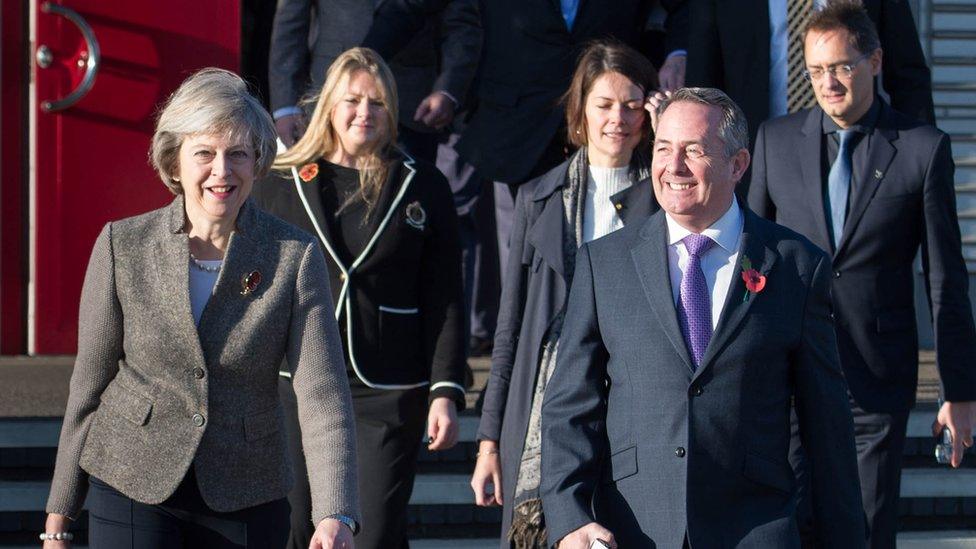May stands firm over Brexit court ruling
- Published

At 37,000 feet, above the roar of the engines propelling the prime minister's official RAF Voyager aircraft towards Delhi, Theresa May's verdict on the raging "Press v judges" dispute was heard loud and clear in the crowded cabin.
"I value the independence of the judiciary," she said. "I also value the freedom of the press."
The latter was "important to democracy", she added.
It was her first contribution since three of the country's most senior judges ruled in the High Court that Parliament should, after all, have the power to trigger the all important negotiations on Britain's exit from the European Union.
The gaggle of Fleet Street correspondents and political editors perked up, and took the brief declaration as the highest possible political cover-fire for what has been some of the most ferocious criticism of senior and respected judges in recent times.
The Daily Mail, for example, splashed the headline "Enemies of the People" across its front page - above pictures of the three presiding judges.
True, no prime minister would ever offer anything other than an unqualified endorsement of press freedom if invited to do so. But Mrs May repeated the words twice. Those who were outraged by the strength of the papers' attacks, and even saw the criticism as an assault on the independence of the judiciary, will be far less pleased than the editors framing the morning editions.
Implacable
As for the implications of the verdict, Mrs May, speaking to journalists accompanying her on her first trade mission outside Europe, was wholly unyielding. She again said there would be an appeal to the Supreme Court.
And to MPs and peers planning to use their votes in Parliaments to try to force much more detail of Britain's negotiations position - and more willingness to compromise in sealing a deal - she was implacable.
"MPs and peers should recognise there was a Parliamentary decision to give a choice to the people in a referendum. Now it's the job of the government to get on and deliver it."
Control of migration was "an important aspect" of the referendum vote to leave the EU.
Pro-European politicians won't be astonished to hear the PM's position articulated in this way. But they will now be preparing for a trial of will and strength in Parliament, as they seek to use their leverage to force the government to compromise with EU leaders and negotiators. Opposition and pro-EU MPs want a Brexit deal which maintains the UK's participation in the EU single market as close to the current terms as possible.
There'll be no Labour attempt to undo Brexit. Today, Labour's leader and deputy leader have said as much. Too many Labour supporters voted to leave. But given a chance, the Opposition will try to write all sorts of conditions into the legislation starting the Brexit talks. The Lords may well be stroppier - even to the extent of stalling Brexit if they can.
Again today Mrs May told reporters she was not anticipating any early general election before the due date in 2020. The message was a snap poll figured nowhere in her plans, and would not happen.
Not everyone's completely convinced. Not yet.